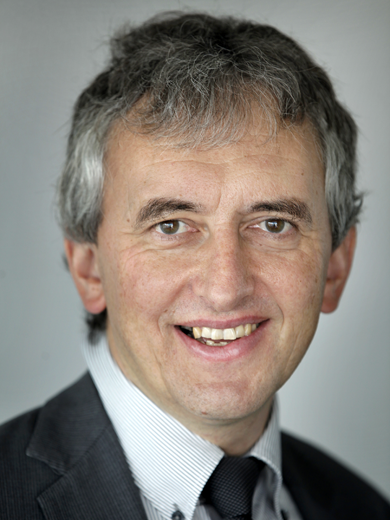Go to
Georges Gielen
Position statement:
The future generations of engineering students need to acquire a different blend of skills and knowledge during their education. Not only are systems becoming increasingly more complex, requiring multidisciplinary methodologies and collaborations, also the progress of knowledge in each discipline makes it difficult or impossible to keep on mastering entire fields in full detail. Hence, system-level thinking will need to be combined with broad basic principles and selective specialization to prepare our students for the fast-changing world they will live in. Interactive and personalized ICT plays an important role in supporting such education, challenging each student on a more individual base. But also hands-on team-based design projects (“learning factories”) are essential to prepare students for their future role in society as designer, innovator or entrepreneur, learning them the baselines to deal with and solve problems not yet existing today.
About the panel member:
 Georges G.E. Gielen received the MSc and PhD degrees in Electrical Engineering from the Katholieke Universiteit Leuven (KU Leuven), Belgium, in 1986 and 1990, respectively. He is full professor at the Department of Electrical Engineering (ESAT). From August 2013 Georges Gielen is also appointed as vice rector for the Group Science, Engineering and Technology and Academic Personnel of the KU Leuven.
Georges G.E. Gielen received the MSc and PhD degrees in Electrical Engineering from the Katholieke Universiteit Leuven (KU Leuven), Belgium, in 1986 and 1990, respectively. He is full professor at the Department of Electrical Engineering (ESAT). From August 2013 Georges Gielen is also appointed as vice rector for the Group Science, Engineering and Technology and Academic Personnel of the KU Leuven.
His research interests are in the design of analog and mixed‐signal integrated circuits, and especially in analog and mixed‐signal CAD tools and design automation. He is coordinator or partner of several (industrial) research projects in this area, including several European projects. He has authored or coauthored 7 books and more than 450 papers in edited books, international journals and conference proceedings. He is Fellow of the IEEE since 2002.
Secondary navigation
- EPFL Workshop on Logic Synthesis and Emerging Technologies
- Luca Amaru
- Luca Benini
- Giovanni De Micheli
- Srini Devadas
- Antun Domic
- Rolf Drechsler
- Pierre-Emmanuel Gaillardon
- Jie-Hong Roland Jiang
- Akash Kumar
- Shahar Kvatinsky
- Yusuf Leblebici
- Shin-ichi Minato
- Alan Mishchenko
- Vijaykrishnan Narayanan
- Ian O'Connor
- Andre Inacio Reis
- Martin Roetteler
- Julien Ryckaert
- Mathias Soeken
- Christof Teuscher
- Zhiru Zhang
- Symposium on Emerging Trends in Computing
- Layout synthesis: A golden DA topic
- EPFL Workshop on Logic Synthesis & Verification
- Luca Amaru
- Luca Benini
- Robert Brayton
- Maciej Ciesielski
- Valentina Ciriani
- Jovanka Ciric-Vujkovic
- Jason Cong
- Jordi Cortadella
- Giovanni De Micheli
- Antun Domic
- Rolf Drechsler
- Henri Fraisse
- Paolo Ienne
- Viktor Kuncak
- Enrico Macii
- Igor Markov
- Steven M. Nowick
- Tsutomu Sasao
- Alena Simalatsar
- Leon Stok
- Dirk Stroobandt
- Tiziano Villa
- Symposium on Emerging Trends in Electronics
- Raul Camposano
- Anantha Chandrakasan
- Jo De Boeck
- Gerhard Fettweis
- Steve Furber
- Philippe Magarshack
- Takayasu Sakurai
- Alberto Sangiovanni-Vincentelli
- Ken Shepard
- VENUE
- Panel on Circuits in Emerging Nanotechnologies
- Panel on Emerging Methods of Computing
- Panel on The Role of Universities in the Emerging ICT World
- Panel on Design Challenges Ahead
- Panel on Alternative Use of Silicon
- Nano-Bio Technologies for Lab-on-Chip
- Functionality-Enhanced Devices Workshop
- More Moore: Designing Ultra-Complex System-on-Chips
- Design Technologies for a New Era
- Nanotechnology for Health
- Secure Systems Design
- Surface Treatments and Biochip Sensors
- Security/Privacy of IMDs
- Nanosystem Design and Variability
- Past Events Archive
